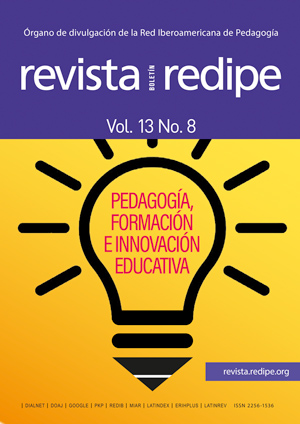Disruptive Innovation in tourism programs at higher education institutions: San Andrés Islands case
Main Article Content
Keywords
Innovation, Institutions of Higher Education, Tourism, Curriculum, Technology
Abstract
Disruptive innovation enables the success and economic growth of tourist destinations by introducing new products, services, or business models that radically change the existing market (Christensen et al., 2015), in such a competitive environment as the tourism sector. This study examined the current state of academic offerings in the tourism sector concerning disruptive innovation at the Higher Education Institutions of San Andrés, Isla. Furthermore, it highlights the significance of disruptive innovation in higher education as a key element for enhancing services in the tourism sector. The research was conducted through a review of existing literature in specialized databases, government websites, institutions, and semi-structured interviews with representatives from identified institutions. The findings revealed that, although there is academic provision in tourism on the island, the integration of content and practices related to disruptive innovation is limited. This suggests that Higher Education Institutions can further integrate these concepts into their programs to transform the local tourism sector. Despite initial challenges, the long-term benefits outweigh these obstacles. Updating the curriculum and strengthening academic offerings according to current trends will promote sustainable growth in the sector in San Andrés. Ultimately, disruptive innovation in higher education is a vital strategy for enhancing the competitiveness of the tourism sector, thus contributing to the island’s economic development and success.
References
Bekele, M.K., Pierdicca, R., Frontoni, E., Malinverni, E.S., Gain, J. (2018). A survey of augmented, virtual, and mixed reality for cultural heritage. Journal on Computing and Cultural Heritage, 11(2),1–36. Doi: https://doi. org/10.1145/3145534
Bonet, J., Ricciulli-Marín, D., & Peña, D. (2021). San Andrés y Providencia en el siglo XXI y la pandemia del COVID-19. Banco de la República-Economía Regional.
Bornhorst, T., Ritchie, JB y Sheehan, L. (2010). Determinants of tourism success for DMOs & destinations: An empirical examination of stakeholders’ perspectives. Tourism Management, 31(5), 572-589. https://doi.org/10.1016/j. tourman.2009.06.008.
Buhalis, D., Leung, D., Lin, M. (2023). Metaverse as a disruptive technology revolutionising tourism management and marketing. Tourism Management, 97, 104724. Doi: https://doi.org/10.1016/j. tourman.2023.104724.
Castro, L., Tamayo, J., Arango, M., Branch, J. & Burgos, D. (2020). Digital transformation in higher education institutions: a systematic literature review. Sensors, 20(11), 3291. Doi: 10.3390 / s20113291.
Chedrawi, C., & Howayeck, p. (2019). Artificial Intelligence a Disruptive Innovation in Higher Education Accreditation Programs: Expert Systems and AACSB. ICT for a better life and better world. Springer, 30, 115-129.ISBN 978-3-030- 10736-9
Christensen, C. M. (1997). The Innovator’s Dilemma: When New Technologies Cause Great Firms to Fail. Boston, MA: Harvard Business Review Press. ISBN: 978-1-4221-9758-5
Christensen, C. M., Raynor, M. E., & McDonald, R. (2015). ¿ What is the disruptive innovation?. Harvard Business Review, 93(12), 44-53. Doi: https:// hbr.org/2015/12/what-is-disruptiveinnovation
Christensen, C.M., McDonald, R., Altman, E.J. and Palmer, J.E. (2018), “Disruptive innovation: an intellectual history and directions for future research”, Journal of Management Studies, Vol. 55 No. 7, pp. 1043-1078, doi: 10.1111/joms.12349.
Cuong NHH, Duy TC (2021). Infraestructura de tecnología de la información para el turismo inteligente en la ciudad de Da Nang. Revista internacional de hiperconectividad e Internet de las cosas , 5(1), 98–108.
Duan X., Dai SL, Liao KC (2020). Investigación sobre el desarrollo coordinado de la innovación tecnológica, el desarrollo económico y el medio ambiente regional: Análisis empírico basado en datos de panel provincial. Investigación en gestión de la innovación científica y tecnológica , 40(1), 89–100.
El Sistema Nacional de Información de la Educación Superior (SNIES) Ministerio de Educación Nacional. (5 de mayo 2023). Programas académicos.
https://hecaa.mineducacion.gov.co/ consultaspublicas/programas
Fennell DA (2021). Tecnología y turismo sostenible en la nueva era de la disrupción. Revista de Turismo Sostenible , 29(5), 776–737.
Freitas, S. I., Morgan, J., & Gibson, D. (2015). Will MOOCs transform learning and teaching in higher education? Engagement and course retention in online learning provision. British Journal of Educational Technology, 46 (3) (2015), pp. 455-471. Doi: https://doi.org/10.1111/bjet.12268
García, L. M., Roblin, N.P. (2008). Innovation, research and professional development in higher education: learning from our own experience. Teaching an Teacher Education, 24, 104-106. Doi: https://doi. org/10.1016/j.tate.2007.03.007
Gardiner, S., Scott N. (2018). Destination Innovation Matrix: A framework for new tourism experience and market development. Journal of destination Marketing & Management, 10, 122- 131. Doi: https://doi.org/10.1016/j. jdmm.2018.07.002
Gössling, S., Scott, D., & Hall, C. M. (2015). Tourism and water. Bristol: Channel View Publications. ISBN: 978-1-84541- 499-3
Gretzel, U., Fuchs, M., Baggio, R. et al. (2020). e-Tourism beyond COVID-19: a call for transformative research. Information Technology & Tourism, 22, 187-203. Doi: https://doi.org/10.1007/s40558- 020-00181-3
Gruescu, R., Nanu, R. y Tanasie, A. (2009). Human resources development and ICT contribution to the tourist destination competitiveness. European Research Studies Journal, 12(4), 87-100. Doi: https://www.um.edu.mt/library/oar// handle/123456789/32165
Guttentag, D.A. (2010) Virtual reality: applications and implications for tourism. Tourism Management, 31 (5), 637–651. Doi: https://doi.org/10.1016/j. tourman.2009.07.003.
Hernández, R., Fernández, C., & Baptista, P. (2016). Metodología de la investigación. 6ta Edición Sampieri. Soriano, RR (1991). Guía para realizar investigaciones sociales. Plaza y Valdés, 150-155.
Hsu, C.(2018). Tourism education on and beyond the horizon. Tourism Management Perspectives, 25. 181-183. Doi: https:// doi.com/10.1016/j.tmp.2017.11.022
Hsu, C.(2021). Learning tourism and hospitality subjects with massive open online courses (MOOCs): A cross-sectional and longitudinal study. Journal of Hospitality, Leisure, Sport & Tourism Education. 29, 100276. Doi: https://doi.org/10.1016/j. jhlste.2020.100276
Hsu, L. (2012). Web 3D simulation-based application in tourism education: A case study with second life. Journal of Hospitality, Leisure, Sports and Tourism Education, 11 (2) (2012), pp. 113-124. Doi: https://doi.org/10.1016/j. jhlste.2012.02.013
INFOTEP San Andrés. (2020), Fortalecimiento de las capacidades técnicas y científicas del Instituto de Formación Técnica Profesional de San Andrés Islas INFOTEP mediante la dotación del laboratorio de Innovación Turística. Sistema General de Regalías. BPIN 2020000100369. CÓDIGO SIGP: 75719. [PDF]



